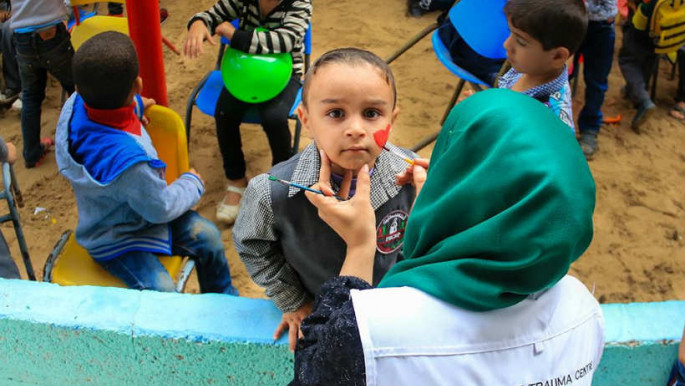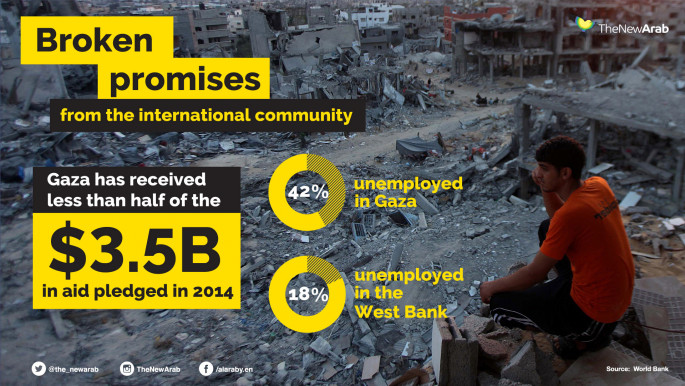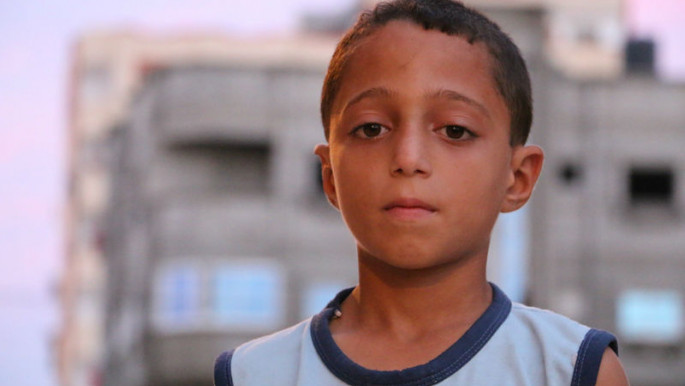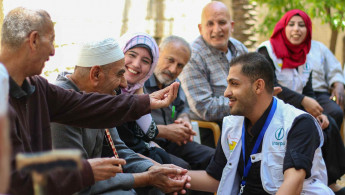Changing perceptions of mental health in the Gaza Strip
Living on a farm in Beit Hanoun on the northern border of Gaza, the Awad family has witnessed far more violence and than most should ever have to experience. They have dealt with more than their fair share of trauma.
In areas near to the Palestinian Authority-governed "buffer zone" between Hamas' Gaza and Israel proper, shelling by the Israeli military is a common occurrence. In times of war, these areas are hit even harder.
Driving through these border areas, the devastation is unmistakable, with blackened shells of buildings lining the road as the separation wall that keeps Gaza's residents separate from the outside world extends across the horizon as far as the eye can see.
The frequent small-scale operations of the Israeli military here highlight the fragility of the situation.
"This prompts a relapse in many patients, undoing the improvement that has been made and plunging sufferers right back into the dark, often bringing worse symptoms than before," explains Rasha Qandeel, director of the Palestine Trauma Centre.
Perceptions of mental health in the Gaza Strip
Mental health problems are widespread here in the Gaza Strip, with many obstacles standing between those in need and the treatment they require.
Lack of services, cost - and, above all, the cultural stigma attached to admitting these problems exist - means many bury their deteriorating conditions and fall off professionals' radar.
Reasons for the shame and embarrassment attached to mental instability can vary between communities. For some, it is seen as a sign that you are not treading the right path with regards to your religion, whereas for others it is more of a social stigma and is particularly identifiable when questions of marriage are raised.
According to the World Health Organisation between 10 and 20 percent of the population here have severe mental illness. Already a high proportion, the reality is likely to be much worse, with many sufferers not accounted for - and therefore unlikely to be receiving treatment.
 |
| Play therapy allows children the mental and physical space to enjoy themselves away from the trauma of their memories [Hannah Ware] |
Reaching those in need
The Palestine Trauma Centre(PTC) is a non-governmental clinic funded in part by British charity Interpal. It was considered a first of its kind in Palestine when it was established in 2007. Providing psychological, social, and specialised medical services for those in the Gaza Strip, the centre is vital for those who have suffered and continue to suffer as a result of both the Israeli and Egyptian blockade on the strip, and the frequent bombardments by Israel - most notably in 2012 and 2014.
A key feature of the centre's efforts is the Family and Community Therapy programme, which is responsible for advocacy and outreach.
"We need to make sure that we are reaching those most in need and do so in three main ways: Field screening, where our psychologists and social workers go out into the communities; referral from partner organisations; and allowing people to come by themselves after hearing about our services," says Qandeel.
Now the PTC has an office space in Gaza City, there has been a noticeable increase in the number of walk-in patients they receive.
 |
|
| [Click to enlarge] |
The opinions surrounding mental health in Arab culture are deeply ingrained in society, and having a space where families can visit that is outside of their communities has proven very effective.
It offers a private space for patients to escape the confines of the cultural stigma.
The centre also offers advocacy and awareness services, including hosting public events in various communities. This aims to encourage open discussion about mental health across all levels of society.
Trauma during war-time
To gain insight into the lives of the families the trauma centre works with is to be exposed to the damning and truly shocking humanitarian impact of Israel's Operation Protective Edge in the summer of 2014.
For thousands like the Awad family, the injuries and loss they experienced have had lasting effects.
Mohammed, the eldest child, was left paralysed after the bones in his legs were shattered. Samir, a younger sibling, was also severely injured after his bedroom was bombed while he slept inside.
Previous wars have left daughter Arwa physically disabled. She spent three days in intensive care after being severely injured by phosphorus rockets.
Phosphorus munitions are not officially banned, but the use of them in crowded civilian areas is prohibited under international humanitarian law.
When exposed to 30°C (86°F), the waxy man-made substance spontaneously ignites and produces intense heat, light and pillars of smoke. It will continue to burn until deprived of oxygen - and if extinguished with water can later reignite, producing poison that can lead to organ failure and death.
Although Israel denies usingsuch weapons, described as "the new napalm", during the 2008 war in Gaza, groups including Amnesty International and Human Rights Watchstate the evidence of use is undeniable.
"I raised seven children; three of them are gone, while another three remain alive but injured."Sahar Awad, the mother of the family, continued: "I spent long days and sleepless nights nurturing them for years so they would grow up - not be killed in seconds."
Sahar suffers from symptoms including hyper-tension, meaning she is constantly alert and fears that death may claim her remaining children at any time. She avoids the places where three of her children were killed.
The physical manifestation of her problematic mental health is a constant pain all over her body which keeps her from being able to live normally.
 |
| Tens of thousands of children here in Gaza have already lived through two full-scale wars, and frequent 'low-level' bombing at other times [Hannah Ware] |
Therapy
Psychologist Sabrin Musa has worked with the Awad family through the PTC's Family and Community Therapy Project. This central project of the organisation aims to empower the family both as a unit and as individuals, to help them overcome complex traumas and build resilience to future hardship.
After 11 sessions, the improvement in both Sahar and her family is very positive. "Now, if I hear slamming doors or screaming children, I can control myself and my reactions. The first thing I do is breathe deeply 10 times," says Sahar. "I am also able to locate the pain in my body and minimise its feeling."
Dr Musa is happy with the family’s progress. "They have reached a state of psychosocial compatibility, and will be able to support each other going forward by being in a caring and understanding community. This supportive environment is as key to development, as are the techniques and skills which I have taught them."
Looking to the future
Director Qandeel is ready to continue expanding the PTC's services and knows this is key to providing effective and essential support.
"Ongoing wars and repeated traumatic events require the sustained attention of the PTC team in all the governorates of Gaza. The next step is to increase the number of staff we have working with us, and open branches in the other cities of the Gaza Strip."
In the past, the prevalence of depression and stress disorders have increased and then fallen as violence peaks and wanes, however since 2014, research by the PTC has noticed an alarming increase that deviates from the trend.
Similarly, before 2014, those reporting symptoms of traumawere largely concentrated in the border areas between Israeli and the Gaza Strip. But since the devastation of Operation Protective Edge, the effects of trauma have spread all across the strip.
The global move in recent decades towards wider societal understanding of mental health is fundamental, and must be nurtured, promoted and supported not least in areas where violent traumatic events are most common.
Hannah Ware has a Master's in Conflict, Security, and Development from King's College London, where she specialised in non-state actor legitimating structures and political violence. She currently works in international development in the MENA region.


![Minnesota Tim Walz is working to court Muslim voters. [Getty]](/sites/default/files/styles/image_684x385/public/2169747529.jpeg?h=a5f2f23a&itok=b63Wif2V)






